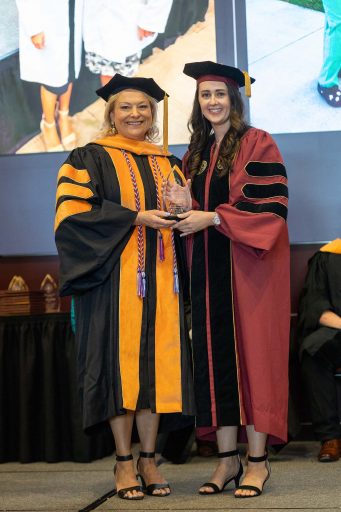The 28 inaugural graduates of the first doctoral program offered at FSU Panama City, the Doctor of Nurse Anesthesia Practice (DNAP), have scored a 100-percent passing rate on the National Certification Examination to become certified registered nurse anesthetists (CRNAs).
“The faculty and staff are dedicated to student success, and FSU Panama City’s stellar record of CRNA exam pass rates proves that,” Dean Randy Hanna said.
Since 2018, the Nurse Anesthesia programs at FSU Panama City have boasted a near –100-percent completion rate and a 100-percent employment rate upon graduation. The former master’s degree program transitioned into the current doctoral program in 2020 after approval by the State University System of the Florida Board of Governors, with the initial cohort of graduates receiving their doctoral hoods in May 2024.

“The achievements of the class of 2024 are nothing short of remarkable,” said Associate Professor Stacey VanDyke, DNP program administrator. “Over the past three years, they’ve completed over 30,000 anesthetics, accumulated 81,000 clinical hours and undertaken a scholarly inquiry project—all while navigating a demanding 99 graduate credit hour curriculum. Their dedication to both theory and practice is evident, setting a high standard for future generations.”
As part of the College of Applied Studies at FSU Panama City, the rigorous 36-month DNAP program includes clinical experience at one of 23 participating hospitals across the southeast to prepare registered nurses to become CRNAs.
“It’s a role of immense responsibility and trust, as CRNAs safely administer over 50 million anesthetics annually in the United States,” VanDyke said. “Their proficiency and dedication make them among the most trusted health care professionals, a fact echoed by Gallup’s recognition of nurses as the nation’s most trusted for 20 consecutive years.”
DNAP graduates taking the National Certification Exam (NCE) within 60 days of graduation have consistently scored a 100-percent passing rate—93 percent of them on their first attempt.
“Administration closely monitors the NCE pass rate as a quality indicator for the Council on Accreditation of Nurse Anesthesia Educational Programs,” VanDyke said. “The fact that we have had such major success with this aspect is a testament to the enhanced quality of the program of study we offer at FSU PC.”
Accredited by the Council on Accreditation of Nurse Anesthesia Educational Programs, the DNAP program’s mission is to embrace the advancement of the science of anesthesiology through a philosophy of intensive scientific education, evidence-based practice and application of clinical education to practice for the betterment of citizens in both the local and national communities
CRNAs practice in every setting in which anesthesia is delivered: traditional hospital surgical suites and obstetrical delivery rooms; critical access hospitals; ambulatory surgical centers; ketamine clinics; the offices of dentists, podiatrists, ophthalmologists, plastic surgeons and pain management specialists; and the U.S. military, Public Health Services, and Department of Veterans Affairs health care facilities.
For more information on the DNAP program, visit pc.fsu.edu/nap.




